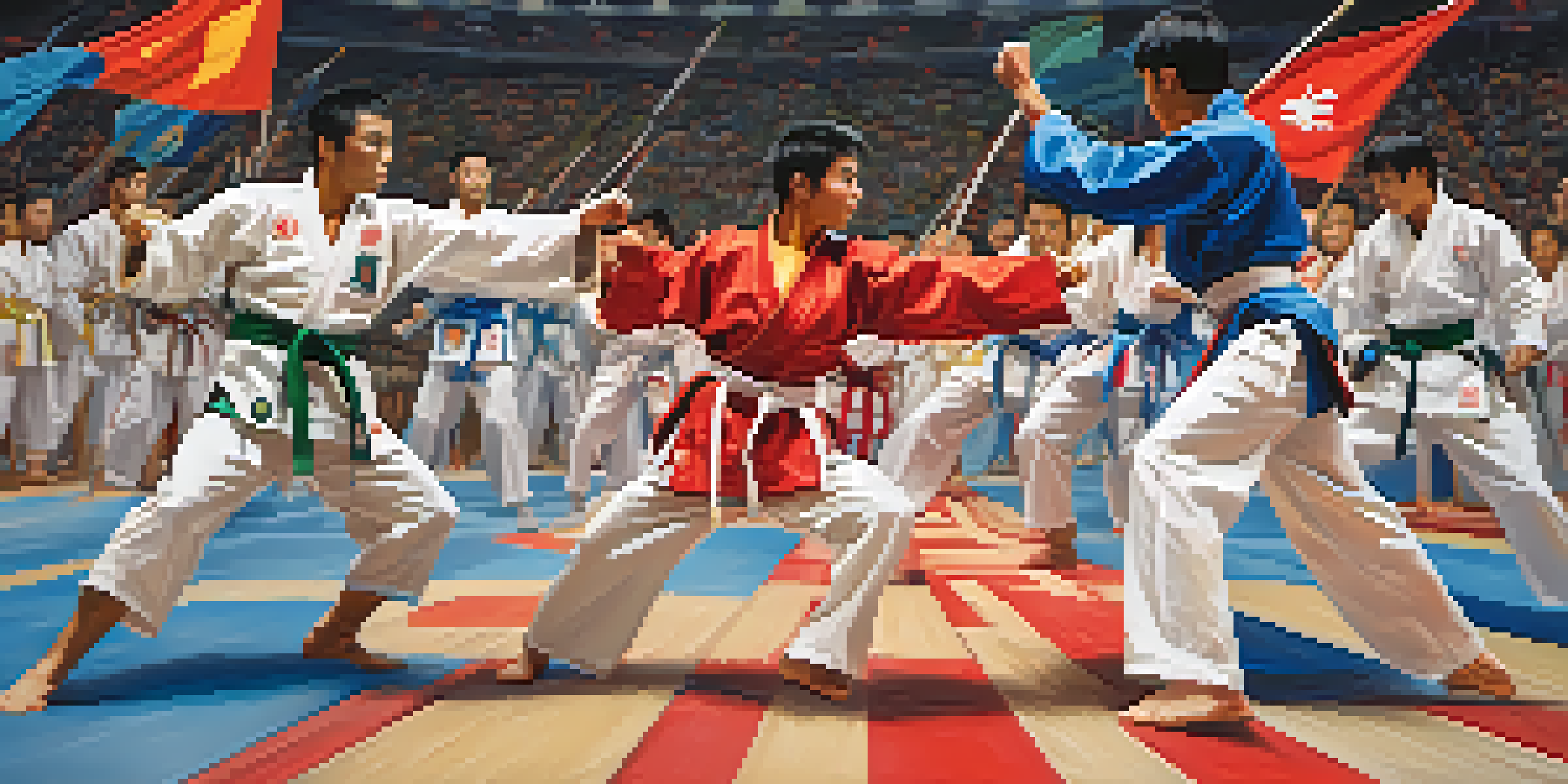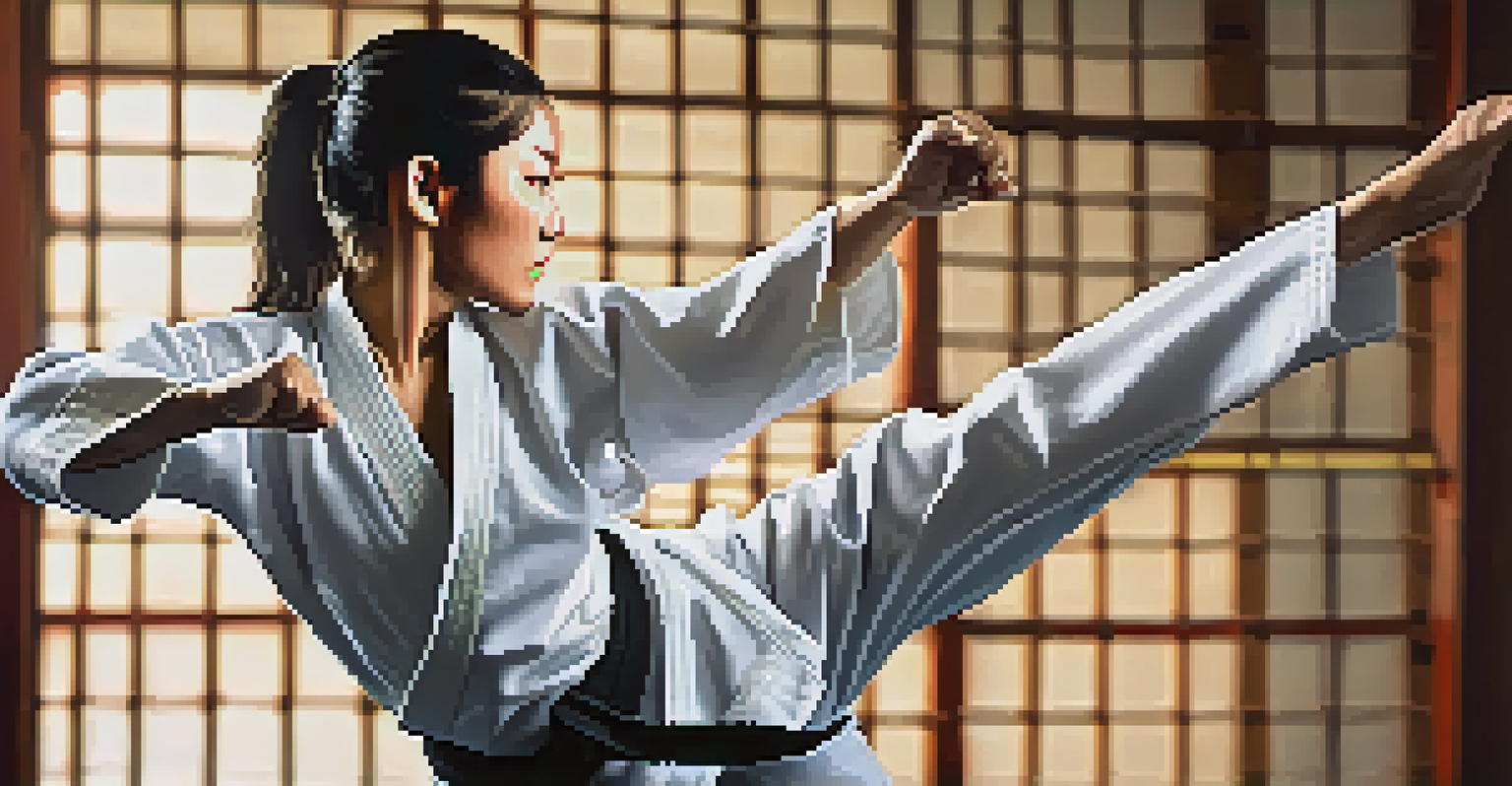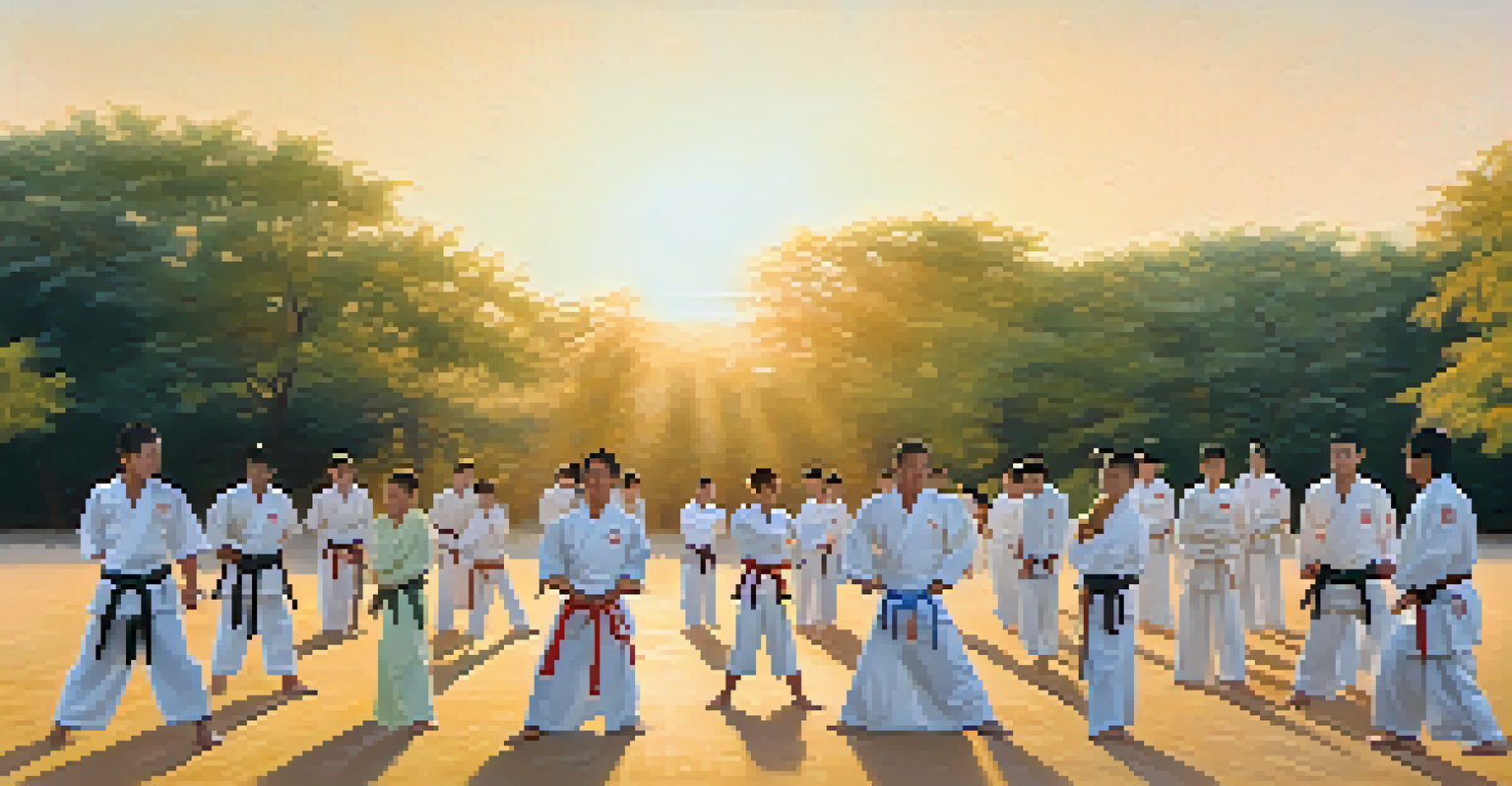Significance of the Olympics in Martial Arts Competitions

A Global Stage for Martial Arts Excellence
The Olympics serve as an unparalleled global platform for martial arts, showcasing the best athletes from around the world. This prestigious event elevates martial arts beyond local competitions, allowing practitioners to compete on an international stage. Athletes from diverse backgrounds come together, representing their countries and cultures, which fosters a sense of unity and respect among martial artists.
The Olympics are a time when we come together as a world, celebrating our differences and our common goals.
For many athletes, the dream of competing in the Olympics is a lifelong ambition that drives their training and dedication. This aspiration not only enhances their skills but also inspires younger generations to take up martial arts. The visibility provided by the Olympics can lead to increased participation at grassroots levels, as communities rally around their national teams.
Moreover, the Olympics highlight different martial arts disciplines, such as judo, taekwondo, and karate, each bringing its unique flair to the competition. This variety showcases the rich heritage and techniques embedded in these sports, promoting greater understanding and appreciation among audiences worldwide.
Boosting Recognition and Popularity of Martial Arts
The inclusion of martial arts in the Olympics has significantly boosted their recognition and popularity. By featuring these sports in such a high-profile event, they gain exposure to millions of viewers, many of whom may not have previously engaged with martial arts. This newfound interest can lead to increased enrollment in martial arts schools and clubs as people seek to learn these exciting disciplines.

As martial arts gain traction, they also attract sponsorships, media coverage, and investment, which are vital for their growth. Financial backing can lead to better facilities, coaching, and training opportunities for athletes. As a result, the overall quality of competition improves, making martial arts even more appealing to participants and spectators alike.
Olympics Elevate Martial Arts
The Olympics provide a global platform that enhances the visibility and appeal of various martial arts disciplines, inspiring participation at all levels.
Additionally, the Olympics can help dispel misconceptions about martial arts being solely about fighting. Instead, viewers witness the discipline, respect, and sportsmanship that are integral to these practices, thus broadening the appeal of martial arts to a wider audience.
Inspiring Athletes Through Olympic Legacy
The Olympic Games create a legacy that inspires current and future martial artists. Athletes who compete at this level become role models, demonstrating the dedication, hard work, and perseverance needed to excel. Their stories of overcoming challenges resonate with aspiring martial artists, motivating them to pursue their dreams.
Martial arts is not about fighting; it's about finding peace within yourself and sharing that with others.
Moreover, the triumphs and struggles of Olympic martial artists are often shared in media, creating narratives that highlight the human spirit. These stories can serve as powerful motivation for young athletes, showing them that success is achievable with commitment and resilience. Witnessing their heroes on the Olympic stage encourages them to push their limits.
This legacy is vital for the evolution of martial arts as a sport. It instills a sense of pride and ambition within the community, empowering martial artists to strive for greatness and to contribute to the sport's development for generations to come.
Fostering International Relations Through Sports
The Olympics foster international relations, and martial arts play a significant role in this diplomatic effort. As nations come together through sport, they can set aside differences and celebrate shared values of respect and dedication. This spirit of camaraderie is evident during martial arts competitions, where athletes often forge friendships that transcend borders.
Martial arts competitions encourage cultural exchange, allowing athletes to learn from one another's techniques and philosophies. This exchange can lead to collaborative training programs and joint events, further strengthening ties between nations. The Olympics serve as a catalyst for these connections, showcasing the power of sport as a unifying force.
Inspiring Future Generations
The stories of Olympic martial artists motivate young athletes to pursue their dreams, fostering a legacy of dedication and resilience.
Ultimately, by promoting peace and understanding, the Olympics create an environment where martial arts can thrive. This not only benefits the athletes but also enriches the cultural fabric of participating nations, emphasizing the importance of cooperation and respect in the martial arts community.
Elevating Standards Through Olympic Training
Competing in the Olympics requires rigorous training and adherence to high standards, which significantly elevates the quality of martial arts. Athletes must meet stringent criteria and undergo extensive preparation to qualify, which pushes them to refine their skills continuously. This drive for excellence cultivates a culture of discipline that permeates the martial arts community.
Olympic-level training often involves advanced coaching techniques, access to state-of-the-art facilities, and exposure to the latest sports science. As athletes experience these resources, they bring their knowledge back to their local communities, raising the overall level of training. This ripple effect enhances the quality of martial arts instruction worldwide.
Furthermore, the focus on performance and competitiveness at the Olympic level encourages martial arts organizations to develop better training programs. As these organizations strive to produce elite athletes, they invest in research and development, ensuring that martial arts continue to evolve and improve.
Promoting Gender Equality in Martial Arts
The Olympics have played a pivotal role in promoting gender equality within martial arts. With events for both men and women, the Games showcase female athletes' incredible skills and contributions to the sport. This representation challenges stereotypes and encourages young girls to pursue martial arts, empowering them to embrace their strength and capabilities.
As female athletes gain visibility on the Olympic stage, they inspire a new generation of women to participate in martial arts. This increased representation cultivates a more inclusive environment, where all athletes can thrive regardless of gender. It also highlights the importance of equal opportunities in sports, motivating organizations to prioritize inclusivity.
Promoting Inclusivity in Sports
The Olympic Games advocate for gender equality in martial arts by showcasing female athletes, encouraging broader participation and support for women in the sport.
Moreover, the success of women in the Olympics can lead to increased funding and support for female martial artists. With more resources dedicated to women’s training and competition, the landscape of martial arts evolves, ultimately benefiting the sport as a whole.
The Lasting Impact of Olympic Participation
Participating in the Olympics leaves a lasting impact on martial artists, shaping their careers and futures. For many athletes, the experience of competing at this level opens doors to numerous opportunities, including sponsorships, coaching roles, and public speaking engagements. This newfound recognition can elevate their status within the martial arts community and beyond.
Even for those who do not win medals, the journey to the Olympics is a significant achievement. It equips athletes with valuable life skills, such as resilience, teamwork, and leadership. These skills often translate into personal and professional success, empowering athletes to excel in various aspects of their lives.

Additionally, Olympic participation can position martial artists as ambassadors for their sport, allowing them to share their passion and knowledge with others. This advocacy helps to promote martial arts and encourage more people to engage with these disciplines, ensuring that the legacy of the Olympics continues to inspire future generations.